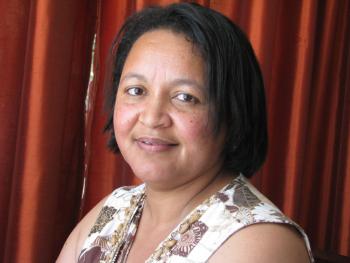Posted on January 19, 2011

The trouble of getting to grips with the story of her grandmother notwithstanding, Merle has continued her attempt to establish how St. Helena and the Cape are connected through the stories of families. Her pursuit has been driven by stories in her own family that maintain that she has connection to the island on both her mother's and her father's sides. So in 2008 she put a notice in newspapers such as the Constantiaberg Bulletin asking people whose ancestry was from St. Helena to get in touch with her. She has had over 200 responses to date and is keeping a database of all those who have responded . The connections that have been made so far are remarkable: whereas Merle initially anticipated responses from Coloured people, she was surprised to hear from white people as well who trace their ancestry to St. Helena. She puts this down to the diverse range of people who settled on the island from Europe, those who were taken there as slaves from Africa and India, as well as Chinese labourers who were recruited after the end of slavery.
Other connections that have been made span the globe in a different way: the St. Helena diaspora is in South Africa, the United Kingdom, Australia, the United States, Canada and New Zealand. People in some of these diverse countries have discovered that they are connected by the same ancestor. The surname Knipe is one example: it was brought to the island by somebody from England. It has spawned a diaspora in different countries. Somebody even wrote to Merle from England saying people in the United Kingdom tend to claim their European ancestry that connects them to St. Helena, but most are not so keen on identifying themselves with ancestors who were slaves.
With her database established and growing, Merle's next move is to establish a website for the Association. She regularly attends heritage events to make the organisation more visible. She and I first met at the annual Heritage Display of the Cape Town Family History Society in September 2010 where she had a display on the work of the Association. She also hosts talks to which she invites professionals working in heritage to share ideas and experiences with community members and grassroots organisations like the South African St. Helenian Heritage Association.
Mbongiseni Buthelezi is the Archival Platform Ancestral Stories Coordinator